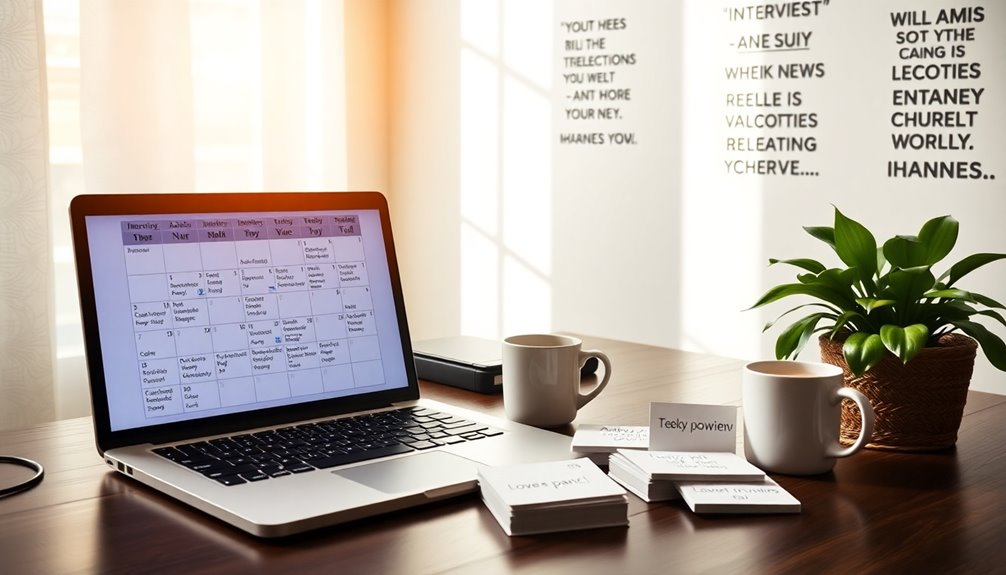When someone asks, "Tell me about yourself," it's your chance to shine. Start with your current role, highlighting key responsibilities and a recent achievement. Use the STAR method to give a clear example that illustrates your impact. Then, connect your past experiences to the skills the job demands, ensuring alignment with the company's values and mission. Don't forget to sprinkle in personal touches, like hobbies or interests that showcase your character. Keep it concise but engaging. With this approach, you'll turn a dreaded question into pure gold, revealing just how much you have to offer. There's more to uncover!
Key Takeaways
- Begin with a brief summary of your current role and key responsibilities to set the context.
- Highlight a recent achievement using the STAR method to showcase your contributions effectively.
- Connect past experiences to the essential skills listed in the job description, emphasizing relevant qualifications.
- Research the company's values and mission to align your personal experiences with their culture and goals.
- Practice your response to ensure clarity and confidence, keeping it concise and engaging within two minutes.
Structuring Your Answer Effectively

Craft a compelling answer by structuring it effectively around the Present, Past, and Future approach.
Start by describing your current role and key responsibilities. For instance, mention a recent achievement that aligns well with the job you're applying for. This sets a strong foundation and shows your capability in real-time contexts.
Next, shift to your past experiences. Highlight roles that are relevant to the position, focusing on specific examples that demonstrate your skills. Use the STAR method to tell concise stories that showcase your actions, results, and the skills you applied. This not only provides clarity but also allows the interviewer to see how your unique experiences align with their needs.
Make sure these experiences resonate with the key skills outlined in the job description.
Finally, look ahead to your future career goals. Explain how the current job aligns perfectly with your aspirations and why it's the logical next step for you. This not only shows your ambition but also signals your commitment to growth within the organization.
Emphasizing Relevant Experience

Relevance is key when discussing your experience in an interview. Start by reviewing the job description to pinpoint essential skills and responsibilities. Compare these requirements with your resume to identify where your qualifications align. Instead of focusing solely on job titles, emphasize achievements and tasks that showcase your capabilities.
When you tie your past work directly to the job requirements, you demonstrate your suitability. Highlight specific skills mentioned in the job description and provide concrete examples of how you applied them. Quantifiable achievements, like a 20% reduction in project time or a 15% boost in sales, can powerfully illustrate your impact. Engaging in dialogue through open-ended questions can further enhance the conversation, showing your interest and understanding of the role. Additionally, demonstrating problem-solving abilities can further highlight your critical thinking skills to the employer.
Don't shy away from discussing experiences in unrelated roles, as skills can transfer. For instance, if you gained marketing skills as a camp counselor, share that. Use the CAR (Challenge, Action, Result) format to structure your examples, making your experiences more engaging and memorable.
Finally, practice presenting your relevant experiences clearly and concisely. This preparation will help you effectively showcase your qualifications and leave a lasting impression on your interviewer.
Connecting to the Job and Company

Connecting your experience to the job and company can greatly enhance your interview performance. To do this effectively, you need to demonstrate your understanding of the company's mission, values, and culture. Start by aligning your skills with the job description and expressing your passion for the role. Know who is interviewing by name can also help you create a personal connection that resonates with the interviewers. Showing enthusiasm not only reflects your interest but also highlights how your goals mesh with the company's objectives. Additionally, embracing cultural intelligence can significantly improve your interactions and collaboration in diverse teams.
Here's a quick table to help you organize your thoughts:
| Area of Focus | Action Steps | Outcome |
|---|---|---|
| Understand the Company | Research mission, values, and culture | Align your narrative with theirs |
| Analyze the Job Description | Identify key skills and qualifications | Tailor your experience to their needs |
| Show Enthusiasm | Discuss your passion for the role | Convey genuine interest |
| Demonstrate Knowledge | Prepare thoughtful questions | Engage better with the interviewer |
Adding Personal Touches

To make a lasting impression during your interview, adding personal touches to your narrative can help you stand out. Start by sharing relevant personal history that connects to your career choices. Briefly mention inspirations or pivotal events that shaped your professional path, keeping the details work-related and concise. Avoid sensitive topics like family or politics.
Next, highlight your interests and hobbies that showcase your personal growth and community involvement. Talk about activities that demonstrate discipline, such as learning a new skill, or mention team sports and volunteering to illustrate your teamwork and social abilities. Make sure these discussions remain brief and professional, relating them back to skills beneficial for the role. Researching the company and the interviewers can further enhance your narrative by aligning your personal interests with the role.
Consider researching the interviewer's interests to find common ground. If you share any backgrounds or hobbies, weave them into your narrative to build rapport and make your response more engaging. Just remember to keep the connection genuine and work-focused.
Finally, always maintain professional boundaries by using good judgment about what to share, keeping the tone light and positive, and making certain your personal details enhance your professional strengths.
Preparing and Practicing Your Response

Crafting your response for the "Tell Me About Yourself" question is crucial for making a strong impression in an interview. Start by reviewing the job description to identify key skills and qualifications. Align your experiences with these requirements and consider the company's needs and values. Remember that setting clear goals can help you articulate your career path more effectively.
Structure your answer using a present-past-future formula. Begin with your current role, highlighting relevant responsibilities. Then, reflect on past experiences and achievements that demonstrate your qualifications. Finally, share your future career aspirations connected to the role.
Keep your answer concise, aiming for two minutes or less. Avoid rambling or including irrelevant personal details. Use storytelling techniques, applying the STAR method to illustrate your points engagingly. This structured approach will help you present your background in a clear and organized manner.
Practice your response with someone who knows you well and seek feedback to guarantee it sounds natural and confident. Be mindful to avoid over-practicing; you want to maintain spontaneity in your delivery.
Tailor your response for different interview scenarios and adjust as needed. By preparing thoroughly, you'll convey your professional journey effectively, leaving a lasting impression on the interviewer.
Frequently Asked Questions
What Should I Avoid Mentioning in My Answer?
When answering, avoid sharing personal information like your age, marital status, or family details.
Don't mention irrelevant hobbies or interests that don't relate to the job.
Keep your response concise; rambling can lose your audience's interest.
Make sure to connect your past experiences directly to the position you're applying for, highlighting relevant strengths.
This way, you'll present yourself as a strong candidate without veering into unrelated territory.
How Can I Handle Nerves During This Question?
When nerves hit during that question, focus on your breathing to stay calm.
Take a moment to gather your thoughts before responding; it's okay to pause.
Maintain good posture and use open gestures to project confidence.
Remind yourself that the interviewer wants to see the best in you, turning the situation into a conversation rather than an interrogation.
Trust in your preparation, and let your passion for the role shine through.
Should I Tailor My Response for Different Interviews?
Absolutely, you should tailor your response for different interviews. Align your skills with each job's requirements, emphasize relevant experiences, and highlight specific achievements.
Research the company's culture and mission to connect your background to their needs. Customize your language and examples to resonate with the industry.
What if My Work Experience Is Limited?
If your work experience is limited, focus on your education, internships, and relevant projects.
Highlight any transferable skills gained from group work, leadership roles, or volunteer experiences. Use quantifiable achievements to showcase your impact, even in smaller settings.
Emphasize your willingness to learn and adapt, aligning your strengths with the company's needs.
Can I Include Career Gaps in My Response?
Absolutely, you can include career gaps in your response! Think of them as opportunities for growth.
Briefly mention the gap, but focus on what you learned during that time, like new skills or relevant experiences.
Highlight how these have prepared you to excel in your current role.
Conclusion
By mastering the art of answering “tell me about yourself,” you can transform a nerve-wracking moment into a powerful opportunity. Did you know that 70% of employers form their first impression of you in just 30 seconds? Crafting a well-structured response that highlights your relevant experience and connects to the job can make all the difference. So, prepare and practice your answer, and you’ll not only stand out but also leave a lasting impact on your audience. By truly understanding the role you are applying for and tailoring your response to showcase how you are the perfect fit, you are crafting the perfect introduction for yourself. This preparation shows that you are serious about the position and have taken the time to consider how you can contribute to the company. By taking this approach, you will set yourself apart from other candidates and make a memorable impression on the interviewer.
Emmeline is the backbone of our content creation team, bringing complex psychological concepts to life with clarity and empathy. As our Expert Writer, she crafts engaging, insightful articles that guide readers through the intricacies of personality assessments and what they reveal about the human condition. Her passion for psychology and personal development shines through in every piece she writes.










